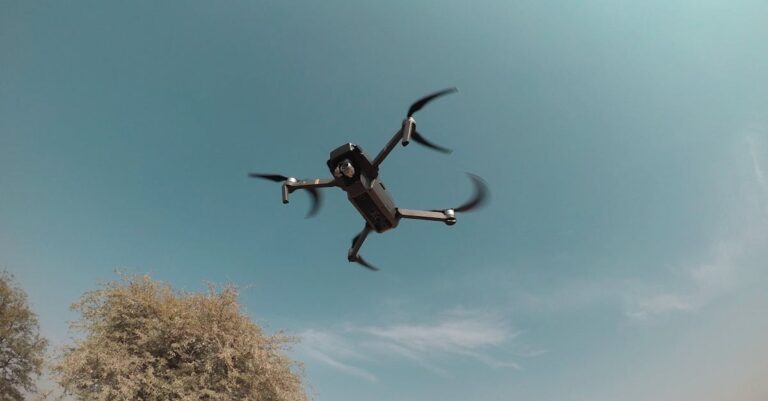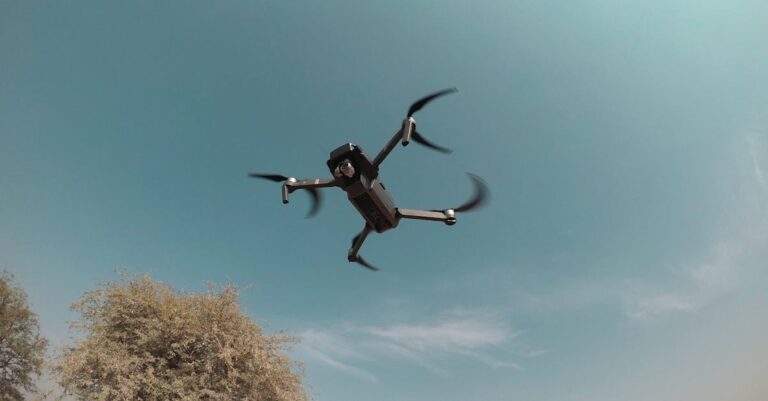Drones are buzzing over New Jersey like seagulls at a beach picnic, and it’s not just for the thrill of aerial selfies. These flying gadgets are reshaping everything from real estate to agriculture, making life a whole lot easier—and a bit more entertaining. Imagine a tiny robot zooming overhead, capturing stunning views while you’re stuck in traffic.
In a state known for its crowded highways and iconic diners, drones are the unexpected heroes we didn’t know we needed. They’re not just toys for tech enthusiasts; they’re revolutionizing industries and sparking conversations about privacy, safety, and the future of flight. So, whether you’re a drone skeptic or a high-flying enthusiast, it’s time to take a closer look at how these flying machines are changing the Garden State, one flight at a time.
Table of Contents
ToggleOverview of Drones Flying Over New Jersey
Drones play a significant role in New Jersey’s economy and daily life. They enhance efficiency in various sectors, including agriculture, where farmers use drones for crop monitoring and analysis. Greater precision in farming leads to improved yields and reduced waste.
Construction companies utilize drones for site surveys and project monitoring. Regular drone inspections help to ensure safety and enhance productivity. Furthermore, real estate professionals employ drones to capture stunning aerial images, making properties more appealing to potential buyers.
The presence of drones has surged, leading to increased discussions about regulations. The Federal Aviation Administration (FAA) imposes strict guidelines to promote safety and proper usage. These regulations cover flight altitudes and restricted areas, protecting both airspace and privacy.
Communities across the state express mixed feelings regarding drone usage. Some residents appreciate the technological advancements, while others voice concerns about privacy and noise. Local governments are addressing these concerns by exploring regulations that balance innovation and individual rights.
Drones create new opportunities for emergency services, enabling rapid reconnaissance during natural disasters. Their ability to provide real-time information aids in effective decision-making and resource allocation. Additionally, drones assist law enforcement in monitoring large events, contributing to public safety.
The future of drones in New Jersey appears promising. The evolving technology will likely lead to even broader applications. As industries adapt and regulations evolve, the impact of drones on daily life continues to grow, shaping how residents interact with their environment.
Current Regulations
Drones in New Jersey operate under a mix of federal and state regulations designed to ensure safety and privacy.
Federal Guidelines
The Federal Aviation Administration (FAA) governs drone activities nationwide. Operators must register drones if they weigh over 0.55 pounds. They must also adhere to rules, such as flying below 400 feet and maintaining visual line-of-sight. For commercial drone usage, specific certifications are required. These include obtaining a Remote Pilot Certificate. Operators must not fly drones over people or moving vehicles, unless they meet specific safety criteria. Violations can result in significant fines. Awareness of these federal guidelines is crucial for anyone operating a drone in New Jersey.
State-Specific Laws
New Jersey imposes additional laws regarding drone usage. Local municipalities have the authority to enact their own regulations, which can vary significantly. For instance, some cities restrict drone flights over public parks or residential areas. State law prohibits drone use for capturing images or videos without consent from individuals on private property. These laws aim to protect residents’ privacy while still allowing for advancements in drone technology. Operators must stay informed about both local and state regulations to avoid penalties. Compliance with these rules ensures responsible drone usage across New Jersey.
Popular Uses of Drones in New Jersey
Drones play a significant role in various sectors across New Jersey, showcasing their versatility beyond recreational use.
Commercial Applications
Commercial uses of drones have expanded rapidly in New Jersey’s industries. Real estate professionals utilize drones for stunning aerial photography, enhancing property marketing. Agricultural specialists rely on drones for crop monitoring, enabling efficient assessment of plant health. Construction companies adopt drones for site surveys and project oversight, streamlining operations. Public safety departments deploy drones for surveillance and search-and-rescue missions, improving response times during emergencies. Each application highlights how drones contribute to increased efficiency and operational effectiveness across different commercial landscapes.
Recreational Use
Recreational drone flying remains popular among enthusiasts in New Jersey. Hobbyists enjoy capturing unique footage of scenic parks and vibrant urban landscapes. Events, such as drone racing, attract participants eager to showcase their piloting skills. Additionally, educational programs engage youth in STEM activities that incorporate drone technology. New Jersey’s regulations support responsible flying while promoting a fun way to experience the outdoors. Enthusiasts often gather at local parks, fostering a sense of community among drone pilots.
Impact on Local Communities
Drones significantly affect local communities in New Jersey, offering both benefits and challenges.
Benefits
Drones enhance property value in real estate by capturing stunning aerial photography. They streamline agricultural practices through efficient crop monitoring, allowing farmers to increase yields. Public safety departments benefit by using drones for quick surveillance, search-and-rescue missions, and disaster response. Educational programs leverage drones to engage youth in STEM activities, building interest and skills. Local businesses also take advantage of drones for promotional content, attracting more customers. Residents experience improved services as drones support various industries, contributing to economic growth.
Concerns and Challenges
Concerns arise regarding privacy, as many residents worry about unauthorized aerial surveillance. Noise pollution also bothers some communities, creating a demand for regulations to mitigate disturbances. Conflicts over local laws can lead to confusion, as municipalities implement different regulations on drone flights. Safety risks also exist, with potential accidents between drones and people or property. In addition, some view drones as intrusive, feeling that their presence disrupts the tranquility of neighborhoods. These challenges prompt ongoing discussions among residents and local governments on how to balance innovation with individual rights.
Future Prospects of Drones in New Jersey
Drones in New Jersey are set to evolve, with advancements shaping their applications across industries.
Technological Advancements
Emerging technologies enhance drone capabilities significantly. Autonomous flight systems streamline operations, enabling drones to conduct tasks with minimal human intervention. Drones equipped with advanced sensors gather real-time data for agriculture, enhancing crop yield and efficiency. Software improvements allow for better image processing, making aerial photography more compelling for real estate marketing. Enhanced battery life extends flight duration, supporting longer missions for public safety and emergency response. Innovations in communication technology enable seamless data transfer, increasing collaborative efforts among emergency services. New Jersey’s landscape is likely to witness further integration of drones into daily life, driving both economic growth and technological progress.
Potential Policy Changes
Ongoing discussions about drone regulation in New Jersey indicate potential policy changes. Federal guidelines may adapt to emerging technologies, impacting operations and safety standards. Local municipalities continue adjusting ordinances, addressing community concerns about privacy and noise. These changes may involve more comprehensive frameworks that harmonize federal, state, and local rules. Engaging stakeholders from various sectors fosters collaboration in crafting effective policies. As drone use expands, legislators might introduce clearer regulations to ensure accountability while promoting innovation. Balancing safety and individual rights will be essential as New Jersey navigates the future of drone technology.
The evolution of drones in New Jersey signifies a transformative shift in various sectors. As they become integral to industries like real estate and agriculture, the conversation around their use continues to grow. Balancing innovation with privacy and safety concerns remains essential for communities across the state.
With regulations evolving and technology advancing, the future of drones holds immense potential. Engaging stakeholders in discussions about responsible use will pave the way for a harmonious coexistence of drone technology and community rights. Whether embraced or scrutinized, drones are undoubtedly reshaping New Jersey’s landscape and daily life.





